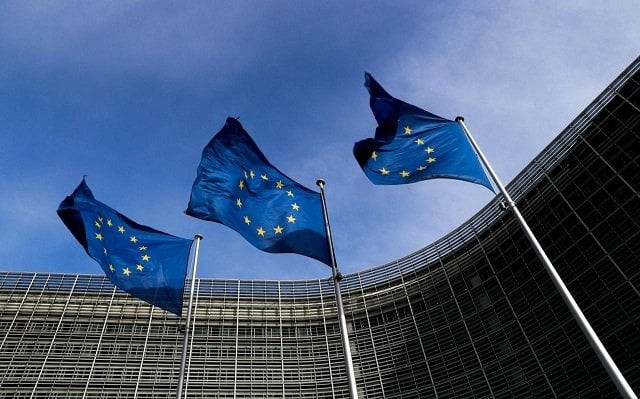The EU counts its crises as problems mount
"Achilles Heel? How many heels can Europe sport? Greece, the United Kingdom, Poland, Hungary - too many, I'd say."

European Union flags flutter outside the EU Commission headquarters in Brussels, Belgium, March 12, 2018.
PHOTO: REUTERS
On Friday, Italy's President Sergio Mattarella swore in an anti-establishment and eurosceptic government comprising the Five Star Movement and the far-right League.
Their agenda - increased public spending in the EU's most indebted nation, coupled with anti-German rhetoric - has led to concerns for the bloc's future and its single currency, the euro.
UK plans to give Northern Ireland joint UK, EU status
Also Friday, Spain's parliament ousted Prime Minister Mariano Rajoy in a no-confidence vote sparked by fury over his party's corruption woes, with his Socialist arch-rival Pedro Sanchez automatically taking over.
"In Spain, it's a localised issue about corruption, but Italy is obviously very serious," John Springford of the London-based Centre for European Reform (CER) think-tank told AFP.
"It is too big to fail in terms of the eurozone, and too big to save."
While Italy is clearly the most pressing danger facing the 28-member bloc, it is not the only one.
Asked this week if Rome had become Europe's Achilles Heel, Gianni Riotta from the Council on Foreign Relations joked: "How many heels can Europe sport? Greece, the United Kingdom, Poland, Hungary - too many, I'd say."
In eastern Europe, European Union officials fret that nationalist governments in Poland and Hungary are undermining democratic standards such as the independence of the judiciary and media freedom.
Brussels launched unprecedented legal action against Warsaw in December over "systemic threats" to the independence of the Polish judiciary.
Britain, meanwhile, is engaged in the painful and at times bitter negotiations to leave the European Union, having decided to leave the bloc in a 2016 referendum.
And Greece is still recovering from its economic depression caused by a sovereign debt crisis which led to multiple bailouts by its EU partners since 2010 that exposed deep tensions in the bloc.
"Europe makes me think of someone that is on the edge of a precipice, even a little bit further along. Its nails are already in the air," former German foreign minister Joschka Fischer said this week.
Veteran financier George Soros, an outspoken proponent of greater EU integration, also warned in recent days that the project was facing "an existential crisis - everything that could go wrong has gone wrong".
Along with its internal issues, the EU faces some of the most serious problems in transatlantic relations since World War II sparked by a series of combative decisions by US President Donald Trump.
From scrapping the 2015 Iran deal against the wishes of his EU partners to imposing trade tariffs on steel and aluminium imports, Trump has pursued his "American First" agenda with little regard for America's traditional allies.
Some analysts say they believe Trump could be the catalyst Europe needs to finally become a more cohesive bloc that comes together to act more forcefully in the face of external threats.
"Trump will perhaps succeed where no one has succeeded before him: by uniting the Europeans," said Pascale Joannin, director of the Robert Schuman think-tank.
This was French President Emmanuel Macron's hope after his election last May, when he came to power promising to reform the EU and arguing that its members needed to club together in an increasingly dangerous world.
He has pitched a vision for the future in which the bloc goes further in linking its economies, political systems and armies to face a range of contemporary threats, from trade and migration to international terrorism and climate change.
A key part of his vision is wealthy northern EU members, particularly Germany, showing more solidarity towards weaker and indebted southern nations such as Italy where economies and wages have stagnated.
As Italy forms anti-establishment government, row erupts with EU
"I personally think that President Macron plays a vital role in brokering a new north-south settlement in the eurozone," former British deputy prime minister Nick Clegg told AFP this week.
But German Chancellor Angela Merkel has so far failed to respond to Macron's ideas, and the new populist government in Rome makes a positive reaction even less likely, said Springford of the CER.
"My sense is that Italy is probably the nail in the coffin for Macron's reforms," he said.
Timothy Garton Ash, a British historian and author, depicted Macron as the only hope for Europe in a column published by the Guardian newspaper on Thursday - but he was pessimistic about his chances.
"Italy is having a nervous breakdown, Spain weighed down by trouble at home, Poland throwing a massive wobbly, Britain hovering near the exit, and Germany slumped on the sofa. Talk about a dysfunctional family," he wrote.



















COMMENTS
Comments are moderated and generally will be posted if they are on-topic and not abusive.
For more information, please see our Comments FAQ